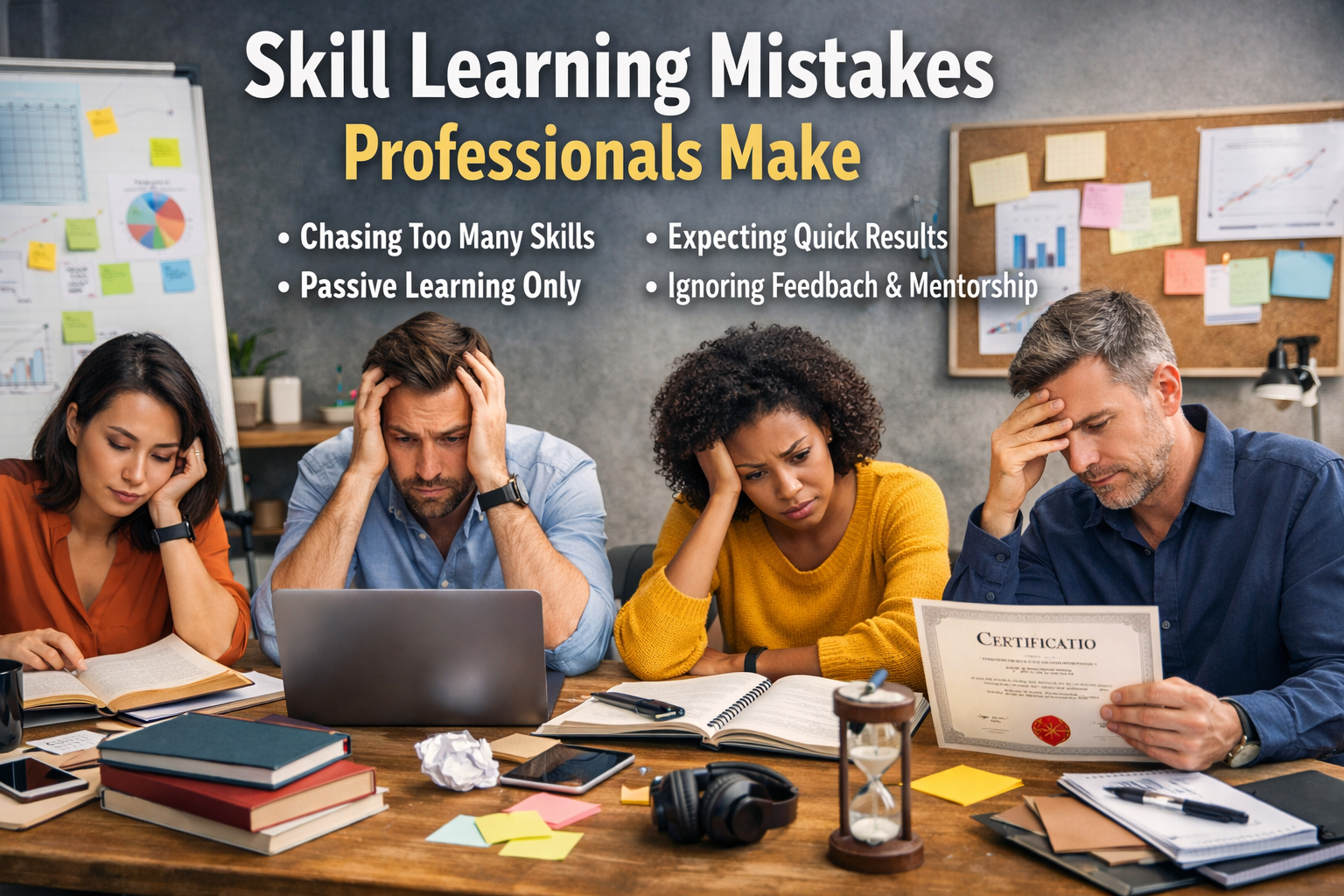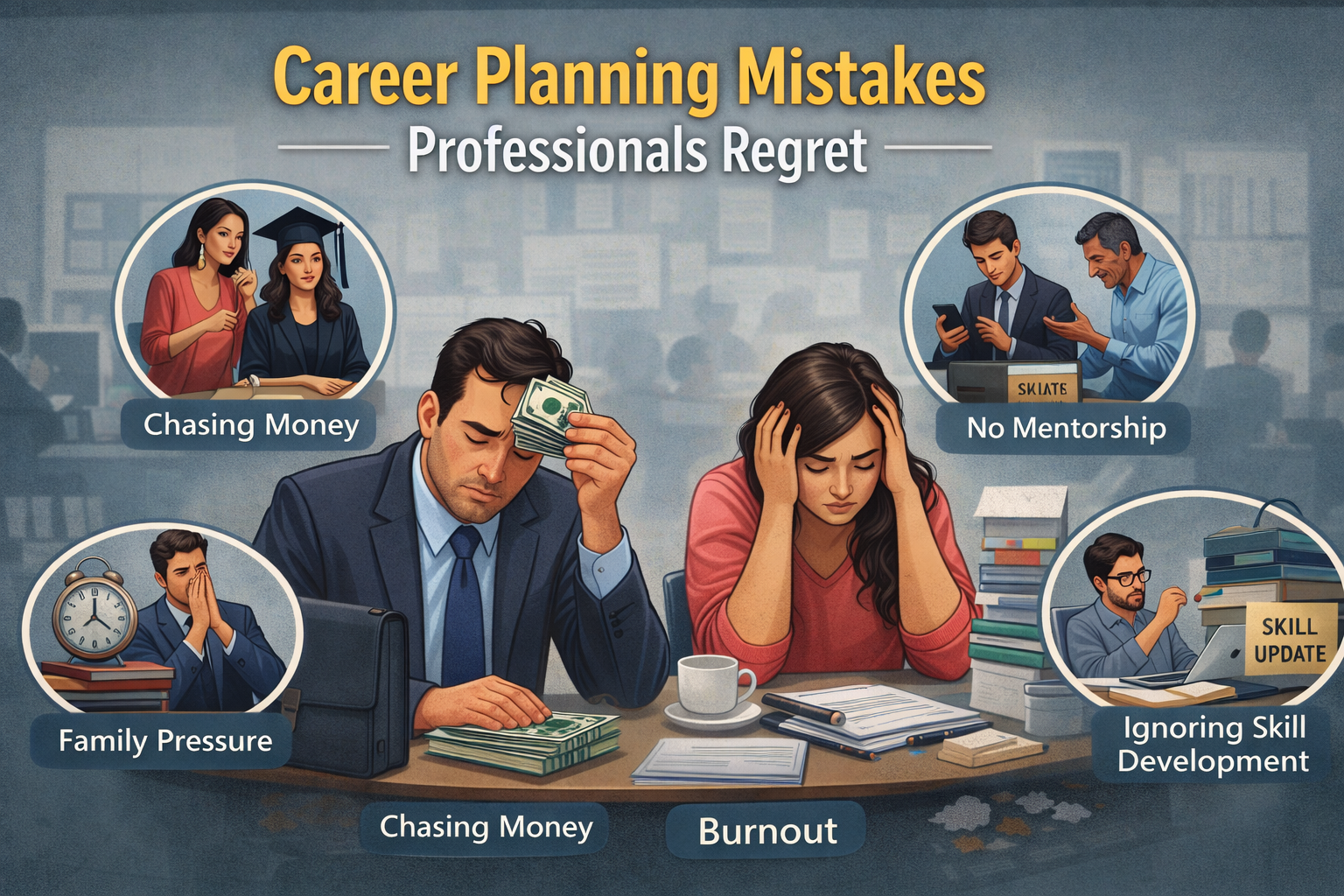Introduction
Are you happy with your job?
Have you ever asked yourself whether you truly like and enjoy the work you do, or if you are just doing it forcefully for the money?
Imagine a person who has always loved teaching and dreamed of becoming a teacher is now working in a bank. On the other hand, there is another person who is a content writer. His interest has always been in this field, but his salary is a bit less than that of the first person but he enjoys his work.
Now tell me, who is happier, the one earning more money, or the one fulfilling his dream?
Some people will find the first person better because he earns more money, and for many people, money is the top priority. But some will prefer the second person because he is fulfilling his dream of becoming a content writer.
We all can say that the second person is happy because he is following his hobby. If you want to stay happy and follow your hobby as a career, then you should read this article.
Read the summary of this article here.
Turning Your Hobby Into a Career :
1. Build a Personal Brand
Personal brand is presenting ourselves in a unique professional identity. It is a combination of our skills, achievements, and experience that separates you from other candidates. Basically, whenever anyone hears your name, in their minds, your image should be clear and positive. This is the goal of personal branding.
Brand consistency means keeping the image tone, style, and message of your brand the same on every platform. From this, the audience can recognize you easily and will trust your brand.
For an example: if you are using a friendly and casual tone on Instagram, then you have to use the same tone on the website and on LinkedIn as well. Logo, colors, and messaging should be aligned. If you use a different look and tone on every platform, the audience can get confused and your brand value could be reduced. Consistency makes your brand identity strong and creates a loyal audience for the long term.
Staying relevant with industry trends related your hobby.
You have to be relevant to industry trends because the market and audience keep changing. If you use outdated ideas and styles, then you will fall behind the competition. To understand, you have to research the market, observe competitors, and take feedback from your audience. But do remember that following every trend blindly is not important; follow only those trends that match your brand values and the interests of your audience.
For example, if there is a trend of eco-friendly products and your brand is about the fashion industry, you can start using sustainable materials from this, and you will be seen as modern and relevant.
Avoiding personal brand-damaging mistakes
Personal brand-damaging mistakes are those that hurt your image and break audience trust. These mistakes can be of any type, like giving wrong information, posting sensitive content, providing poor customer service, or failing to fulfill promises. To avoid these mistakes before posting your content, proofread every public statement, and give a timely solution to customers.
If you have made any mistake unintentionally, so instead of covering it, you should acknowledge it openly and try to give a solution. Transparency and honesty help your brand recover, but making the same mistake repeatedly can lose the audience permanently.
Try to avoid mistakes as much as you can.
2. Start Small and Build Experience
Turning your hobby into a career doesn’t happen overnight — start small and grow steadily. Begin by treating it as a side hustle while gaining experience and understanding your audience. Take freelance or project-based opportunities to learn how the market works and to build confidence. In the beginning, offering free or discounted services can help you create your first portfolio and collect testimonials.
Every small project adds value, teaches new lessons, and strengthens your credibility. With time, consistency, and experience, your side hustle can evolve into a full-time, fulfilling career doing what you love.
3. Create an Online Portfolio
Optimizing your online presence means creating profile, content, engagement with professionals, and becoming a consistent presence on a platform. This includes high-quality profile pictures, a clear bio, relevant keywords, and sharing valuable content. It boosts your visibility, credibility, and career or business opportunities.
LinkedIn profile optimization
Your LinkedIn profile is your digital first impression — it’s often the first place recruiters and potential employers check before contacting you. To make it effective, start with a professional profile picture and a clear, keyword-rich headline that reflects your role or target position (e.g., “Aspiring Digital Marketer | Content Creator | SEO Enthusiast”).
Let’s see in detail;
Professional Profile Picture
Your profile photo is the first thing people notice. Make sure it’s:
- High quality (clear, not pixelated)
- Professionally dressed
- Friendly and approachable expression
- Clean background
Tip: Avoid selfies or party photos — go for a simple headshot with good lighting.
Catchy & Clear Headline
Your headline doesn’t have to be just your job title. Use it to show your value, skills, and target role.
Examples:
“Unemployed | Looking for work”
“Content Writer | SEO Specialist | Helping Brands Grow with Engaging Content”
A good headline grabs attention and helps you appear in searches.
Strong About Section (Summary)
This is where you tell your professional story. Use simple language to cover:
- Who you are
- Your top skills and experience
- Your goals or what you’re looking for
- A call to action (e.g., “Open to new opportunities” or “Let’s connect!”)
- Use short paragraphs or bullet points to make it easy to read.
Experience & Roles
Don’t just list job titles — explain what you actually did. For each role:
- Mention your key responsibilities
- Highlight accomplishments
- Add numbers or results when possible
“Increased blog traffic by 60% in 6 months through SEO strategy and content updates.”
This helps recruiters understand your impact.
Skills & Endorsements
Add relevant skills to your profile — LinkedIn allows up to 50, but focus on your top 10–15. Ask colleagues or past clients to endorse your top skills to build credibility.
Pro Tip: Match your skills to the jobs you’re targeting.
Recommendations
Recommendations are like reviews for your work. Politely request a few from:
- Former managers
- Teammates
- Clients or mentors
Using personal websites or portfolios
A personal website or portfolio is your online space to showcase skills, work, and achievements. It builds credibility, gives you full control over your personal brand, and makes it easy for recruiters or clients to find you. Include a professional bio, best work samples, testimonials, resume/CV, and contact details. You can also add a blog to share insights and establish authority. Keep the design clean, mobile-friendly, and easy to navigate. Use high-quality visuals and clear descriptions for each project. A strong portfolio not only highlights your expertise but also leaves a lasting impression that can open doors to new career opportunities.
If you want to learn in detail about LinkedIn—such as how to build a strong LinkedIn profile, what type of format and content works best, how to network on the platform, and why networking is important—then you can read these two articles. These articles are among the best for understanding how to effectively leverage LinkedIn and master networking strategies.
4. Monetize Your Hobby
Once you’ve built skills and credibility, it’s time to turn your passion into profit. There are many ways to monetize your hobby — through freelancing, selling products or services, teaching, affiliate marketing, or creating digital products like eBooks and online courses.
You can also earn active income by working directly with clients or passive income by selling something that earns even when you’re not working, such as digital downloads or recorded workshops. For example, artists can sell handmade items, writers can offer coaching, and fitness enthusiasts can launch online training sessions. Choose the model that fits your lifestyle and goals.
5. Network and Collaborate
Networking is very important in job hunting because, with the help of networking, you can reach those opportunities that are sometimes unavailable on job portals. Many companies hire candidates freshers or through referrals, which means that if you have a strong network, you will be aware of those jobs. You get real industry insight from networking, like which skills are in demand, what the company’s culture is, or what the expectations of a specific role are.
When you interact with a professional, it also boosts your confidence and improves your communication skills. Which helps in your interview. Networking is not limited to jobs only – it can also be one way for freshers long-term career growth. If today you are having a small conversation with a professional person, no one knows, maybe the next day that person will be the reason for your big opportunity.
6. Manage Time and Finances Wisely
Time management is the backbone of successful remote work. It allows you to stay focused, complete tasks efficiently, and meet deadlines without unnecessary stress. With proper planning and discipline, workers can maintain a healthy work-life balance, avoid burnout, and make the most of the flexibility that jobs offer. Moreover, mastering time management builds reliability and professionalism, helping you grow in your career while staying productive and motivated every day.
7. Stay Motivated and Keep Evolving
For a job seeker, many things are important and there are also many challenges. But the most important thing for growth as a job seeker is self-motivation. If you are self-motivated, they can overcome all challenges, handle their work easily, and build their career successfully. In fact, self-motivation is not only important for job seekers but for everyone, whether it’s a child, a worker, or a student. Because without self-motivation, work cannot be done properly.
Job seekers should always stay self-motivated and keep appreciating themselves, whether it’s for a small achievement or completing a big task. And even if they don’t achieve something at times, they should still appreciate themselves for the effort and for giving their best.
When we stay self-motivated, we give our 100% to our work, which improves the quality of our work, earns us appreciation, and builds trust with others.
Conclusion
Turning your hobby into a career is no longer just a dream — it’s a real possibility in 2025. This article covered how to recognize your hobby’s potential, build professional skills, create a personal brand, gain experience through small projects, and explore different ways to earn from your passion.
By following these steps, you can transform what you love doing into a meaningful and profitable career. It will help you stay motivated, enjoy your work, and achieve success with purpose and happiness. Remember — your hobby can be the foundation of your future if you take the first step today.
Explore various opportunities related to your hobby with Best Job Tool.







Leave a Reply